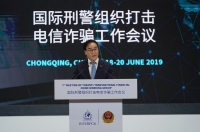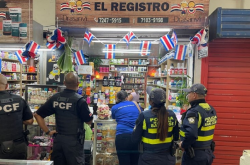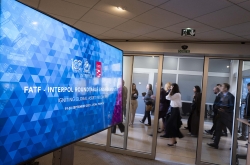CHONGQING, China – Tackling the threats posed by telephone scams and other social engineering fraud was the focus of an INTERPOL meeting on financial crimes.
The 7th Meeting of the INTERPOL Anti-Transnational Financial Crime Working Group brought together experts to discuss the global response to several types of fraud scams which criminal networks are using to swindle unsuspecting victims out of their money.
The three-day (18 – 20 June) meeting, organized by INTERPOL and the Chinese Ministry of Public Security and hosted by the Chongqing Municipal Government, looked at three key topics:
- Telecom fraud – criminals set up call centres where the callers use a variety of ruses to trick victims into making payments;
- Social engineering fraud – including business e-mail compromise (BEC) scams, romance scams, sextortion, and boiler room or investment fraud;
- Money laundering and money mules – the criminals often use money mules to transfer their illicit profits.
Telecom fraud is a growing concern across Asia and beyond. Criminal enterprises set up call centres in various countries, often targeting elderly individuals by pretending to be government officials, police officers or bank managers and requesting the victims make urgent payments.
INTERPOL has coordinated several operations targeting telecom fraud in Asia. Operation First Light in 2016 led to the arrest of more than 1,500 individuals as police shut down more than a dozen illicit call centres in Asia and Europe.

“The use of technology to commit fraud is not new. But the Internet and social media now enable criminals to expand their geographical reach, to diversify their targets and activities, often without even the need for in-person interactions or a physical presence,” said INTERPOL President Kim Jong Yang.
To effectively counter these challenges, he highlighted the importance of establishing robust cooperative relationships to build a law enforcement network with a global reach and knowledge base.
In this respect, the meeting also addressed how the criminal networks use money mules to accept the illicit payments, transfer funds into the criminals’ accounts or launder the proceeds. In many cases, these individuals do not even know that they are involved in a criminal activity as they are kept unaware of the source of the payments.
Underscoring the global nature of these crimes, the working group meeting was attended by more than 70 law enforcement participants from 42 countries and territories, as well as ASEANAPOL.











